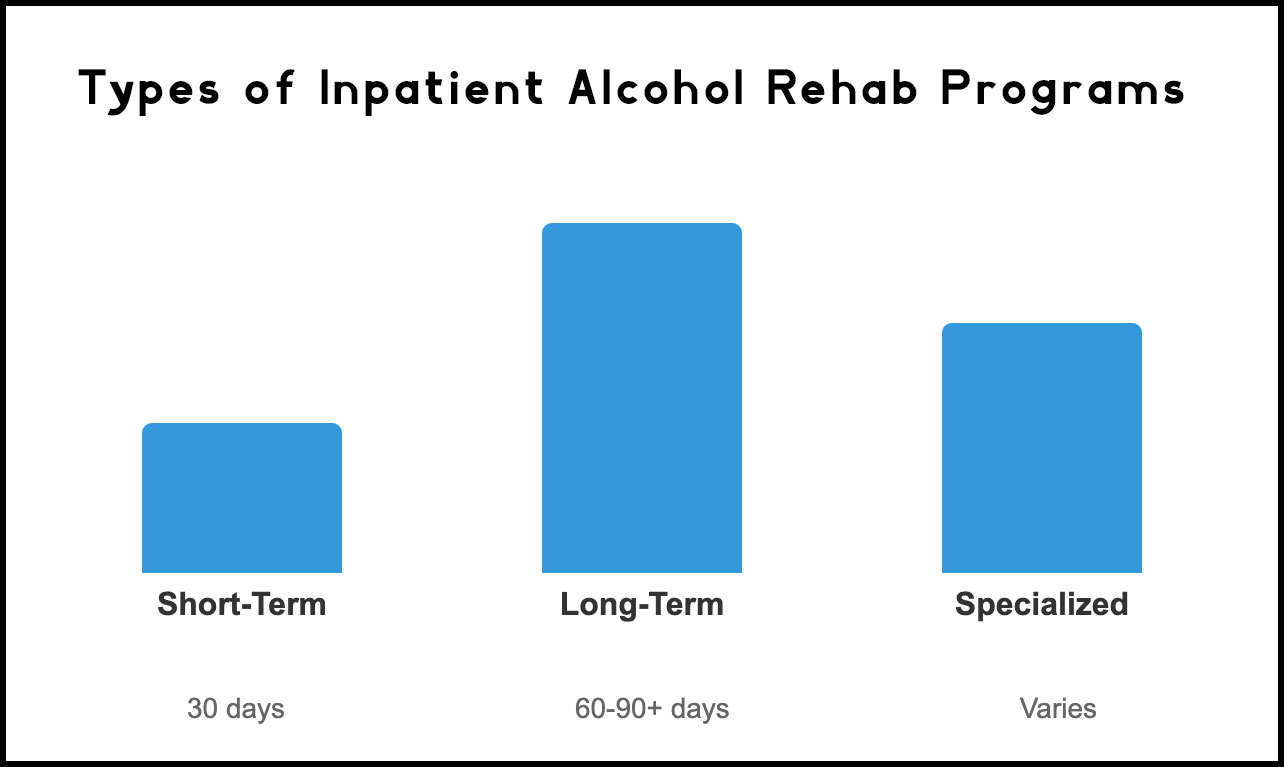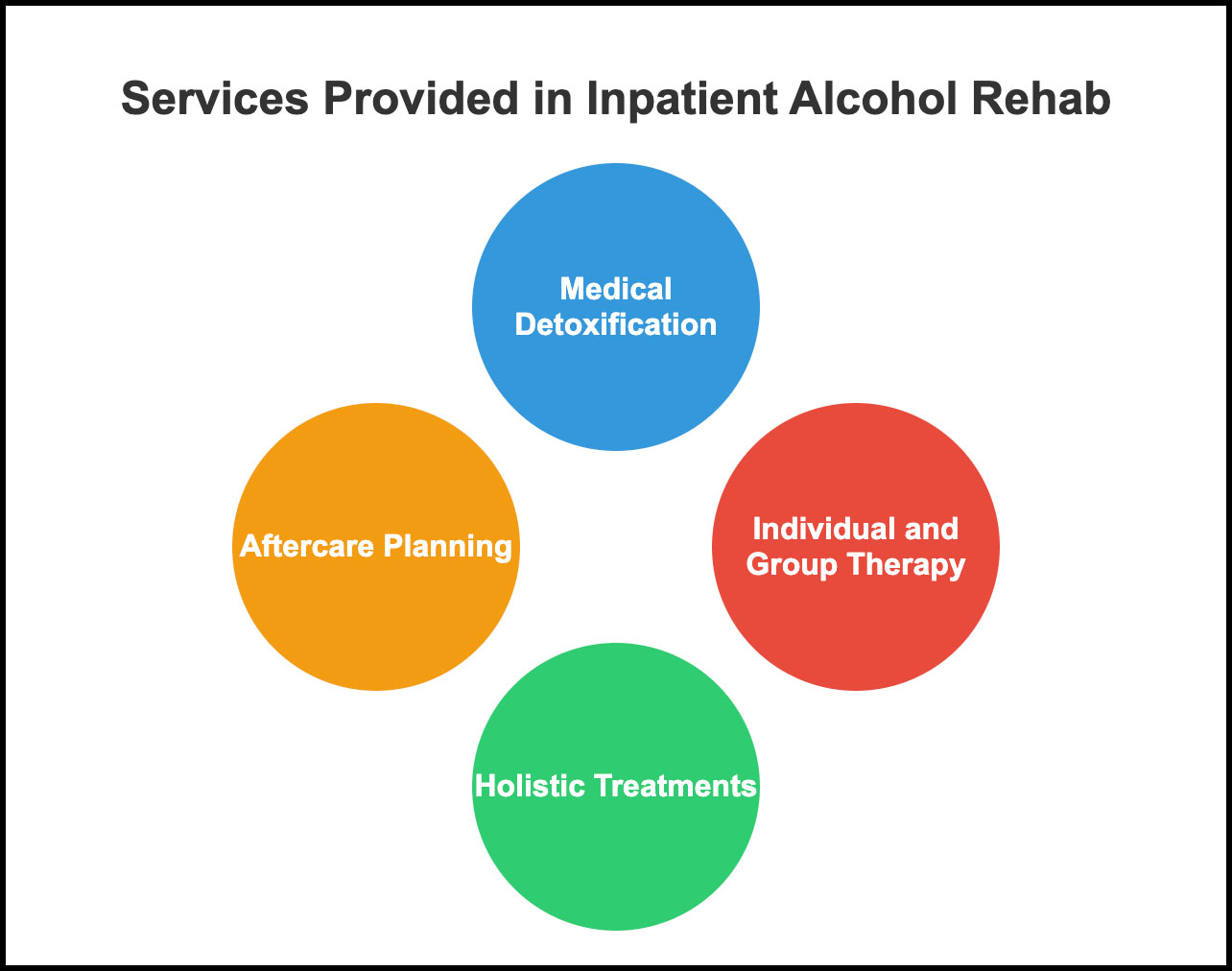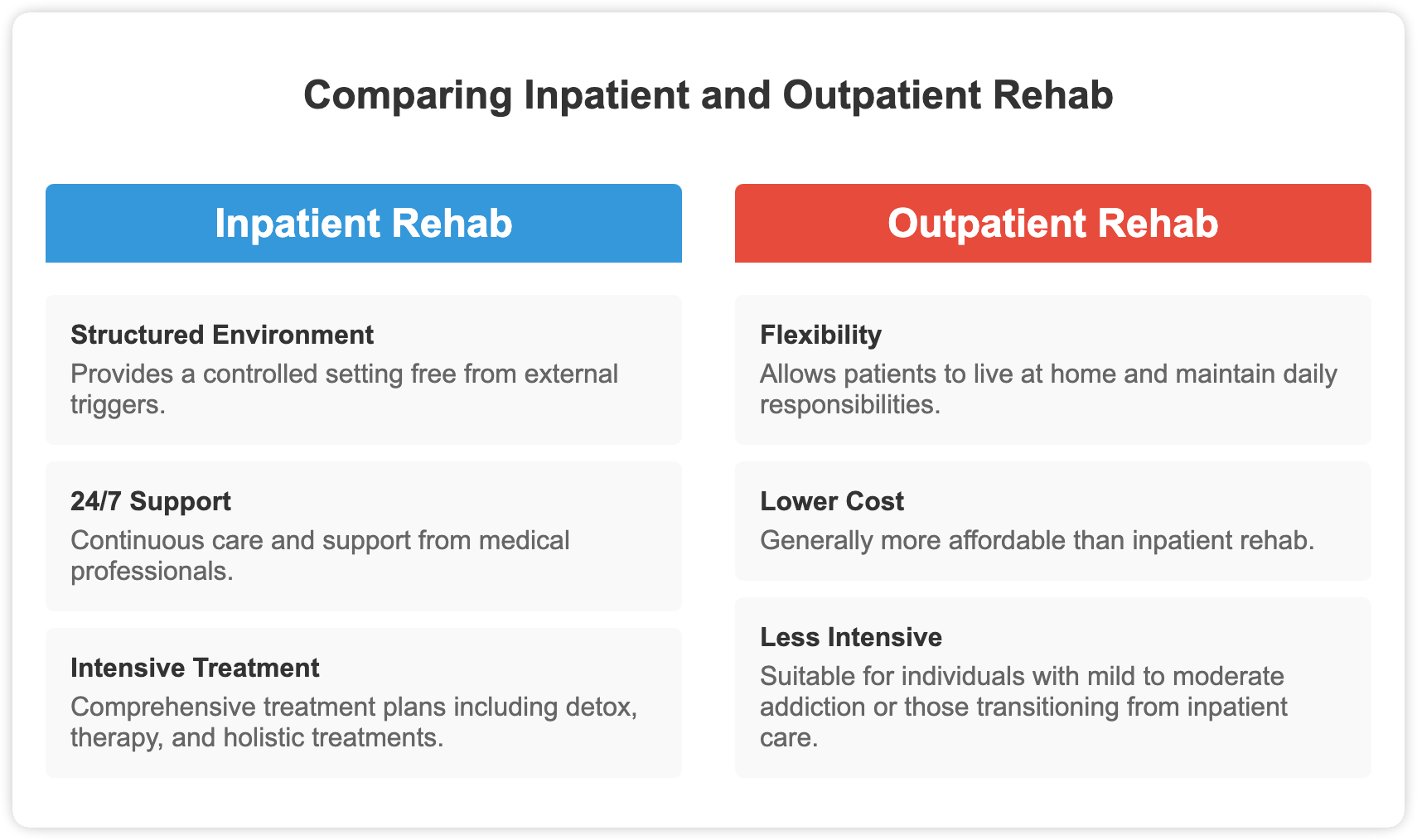Inpatient alcohol rehab in Los Angeles offers a structured and supportive environment for individuals struggling with severe alcohol addiction.
Los Angeles rehab centers provide some of the most comprehensive treatment plans, medical and psychological care, and a community of peers to support recovery.
Understanding the benefits and services of inpatient rehab can help you or your loved ones make informed decisions about seeking treatment.
Key Takeaways
- Inpatient alcohol rehab offers 24/7 support and a structured environment.
- Comprehensive treatment plans include medical detox, therapy, and holistic treatments.
- Factors to consider when choosing a rehab center include location, accreditation, and personalized treatment plans.
- Medical professionals play a crucial role in the recovery process.
- Understanding costs and insurance coverage is essential for planning treatment.
Understanding Inpatient Alcohol Rehab
Inpatient alcohol rehab is a residential treatment program where individuals stay at a rehab facility for a designated period.
This type of rehab is essential for those with severe alcohol addiction, as it provides a controlled environment free from external triggers and distractions.
In Los Angeles, various inpatient rehab centers offer tailored programs to address the unique needs of each patient.
Inpatient rehab programs typically involve a combination of medical detoxification, individual and group therapy, and holistic treatments such as yoga and meditation.
These programs aim to address the physical, emotional, and psychological aspects of addiction, providing a comprehensive approach to recovery.
Benefits of Inpatient Alcohol Rehab in Los Angeles
Choosing inpatient alcohol rehab in Los Angeles comes with several benefits:
- Structured Environment: Patients receive 24/7 support in a structured setting, reducing the risk of relapse.
- Comprehensive Treatment Plans: Rehab centers offer a range of therapies and treatments tailored to individual needs.
- Medical and Psychological Care: Access to qualified medical staff ensures continuous monitoring and care.
- Community Support: Being surrounded by peers who are also on the recovery journey fosters a sense of community and mutual support.
Types of Inpatient Alcohol Rehab Programs
In Los Angeles, inpatient alcohol rehab programs can vary in duration and focus:
- Short-Term Inpatient Rehab: These programs typically last 30 days and are suitable for individuals who need intensive but brief treatment.
- Long-Term Inpatient Rehab: Programs lasting 60 or 90 days or longer, ideal for those with severe addiction or those who have relapsed before.
- Specialized Inpatient Programs: These cater to specific needs, such as dual diagnosis treatment for individuals with co-occurring mental health disorders.
Choosing the Right Inpatient Alcohol Rehab Center
Selecting the right inpatient rehab center is crucial for successful recovery. Consider the following factors:
- Location: Proximity to home or a desire for a new environment can influence your choice.
- Accreditation and Licensing: Ensure the facility is accredited and follows state regulations.
- Treatment Approach: Look for personalized treatment plans that address individual needs.
- Facilities and Amenities: Assess the quality of accommodations, recreational facilities, and additional services offered.
- Reviews and Testimonials: Read reviews and testimonials from former patients to gauge the center’s effectiveness.
For more information, visit Revive Detox Los Angeles and their inpatient addiction treatment program.
Services Provided in Inpatient Alcohol Rehab
Inpatient alcohol rehab centers in Los Angeles offer a variety of services to support recovery:
- Medical Detoxification: The first step in treatment, medical detox helps manage withdrawal symptoms under medical supervision.
- Individual and Group Therapy: Therapy sessions address the underlying causes of addiction and provide coping strategies.
- Holistic Treatments: Programs may include yoga, meditation, art therapy, and other holistic approaches to support overall well-being.
- Aftercare Planning: Developing a plan for continued support post-rehab, including outpatient therapy and support groups, is crucial for long-term success.
Role of Medical Professionals in Inpatient Rehab
Qualified medical professionals are essential in the inpatient rehab process. Their roles include:
- Doctors and Nurses: Provide medical care and monitor patients’ health.
- Therapists and Counselors: Facilitate individual and group therapy sessions.
- Support Staff: Assist with daily activities and provide emotional support.
Having a team of experienced professionals ensures that patients receive comprehensive care tailored to their needs.
Continuous monitoring and support from medical staff are crucial for managing withdrawal symptoms and addressing any health complications that may arise during treatment.
Holistic Treatments in Inpatient Alcohol Rehab
Holistic treatments are an integral part of many inpatient alcohol rehab programs in Los Angeles.
These treatments aim to address the mind, body, and spirit, offering a comprehensive approach to recovery.
Common holistic treatments include:
Yoga and Meditation
Yoga and meditation help patients manage stress, improve mental clarity, and enhance physical well-being. These practices are beneficial for developing coping mechanisms and maintaining sobriety.
Art and Music Therapy
Art and music therapy provide creative outlets for expressing emotions and experiences related to addiction. These therapies can improve emotional health and contribute to overall recovery.
Nutritional Counseling
Proper nutrition is vital for physical recovery. Nutritional counseling ensures patients receive balanced meals that support healing and improve energy levels.
Family Involvement in Inpatient Alcohol Rehab
Family involvement can significantly impact the success of inpatient alcohol rehab. Many centers in Los Angeles offer family therapy sessions and education programs to help families understand addiction and support their loved ones.
Family Therapy Sessions
Family therapy sessions address relationship dynamics and communication issues that may have contributed to the addiction. These sessions aim to rebuild trust and create a supportive home environment.
Education and Support Programs
Education programs provide families with information about addiction, recovery, and how to support their loved ones post-rehab. Support groups for family members offer a space to share experiences and gain insights from others in similar situations.
Comparing Inpatient and Outpatient Rehab
When deciding between inpatient and outpatient rehab, it’s essential to understand the differences and benefits of each.
Inpatient Rehab
- Structured Environment: Provides a controlled setting free from external triggers.
- 24/7 Support: Continuous care and support from medical professionals.
- Intensive Treatment: Comprehensive treatment plans including detox, therapy, and holistic treatments.
Outpatient Rehab
- Flexibility: Allows patients to live at home and maintain daily responsibilities.
- Lower Cost: Generally more affordable than inpatient rehab.
- Less Intensive: Suitable for individuals with mild to moderate addiction or those transitioning from inpatient care.
Inpatient vs Outpatient : Which is Best for You?
Understanding the challenges patients may face during inpatient alcohol rehab can help in preparing for the journey ahead.
Dealing with Withdrawal Symptoms
Withdrawal symptoms can be severe and require medical supervision. Inpatient rehab provides the necessary medical support to manage these symptoms safely.
Emotional and Psychological Challenges
Patients may experience emotional and psychological challenges, such as anxiety, depression, and cravings. Therapy and support groups within the rehab facility help address these issues.
Adjusting to a New Environment
Adjusting to the structured environment of inpatient rehab can be challenging. Support from staff and peers can ease this transition and help patients feel more comfortable.
Success Rates and Outcomes of Inpatient Rehab
Inpatient alcohol rehab centers in Los Angeles have varying success rates, influenced by several factors:
- Personal Commitment: The patient’s dedication to recovery significantly impacts the outcome.
- Quality of Care: Access to high-quality medical and psychological care improves success rates.
- Aftercare Support: Ongoing support after rehab, including therapy and support groups, is vital for maintaining sobriety.
Statistics show that inpatient rehab has higher success rates compared to outpatient programs, mainly due to the structured environment and continuous support provided. Personal stories and testimonials from former patients highlight the effectiveness of these programs in helping individuals achieve long-term sobriety.
Costs and Insurance Coverage for Inpatient Alcohol Rehab
Understanding the costs associated with inpatient alcohol rehab in Los Angeles is crucial for planning treatment:
- Average Costs: Inpatient rehab can range from $10,000 to $30,000 for a 30-day program, depending on the facility and services offered.
- Insurance Coverage: Many insurance plans cover part or all of the cost of rehab. It’s important to check with your provider to understand your coverage options.
- Financial Assistance: Some rehab centers offer payment plans or sliding scale fees based on income. Scholarships and grants may also be available for those who qualify.
Planning for the financial aspect of rehab ensures that you can focus on recovery without the added stress of financial burdens.
Preparing for Inpatient Alcohol Rehab
Preparing for inpatient rehab involves both practical and emotional steps:
- Admission Process: Understand what to expect during the intake process, including assessments and paperwork.
- Packing Essentials: Bring necessary items such as clothing, toiletries, and personal items. Avoid bringing prohibited items as specified by the rehab center.
- Mental and Emotional Preparation: Acknowledge the challenges ahead and commit to the recovery process. Preparing mentally and emotionally can make the transition to rehab smoother.
Being well-prepared can help alleviate some of the anxiety associated with starting inpatient rehab, allowing you to focus on your recovery journey.
For more information on finding the right treatment, visit SAMHSA’s Treatment Locator.
FAQs
What is the difference between inpatient and outpatient rehab?
Inpatient rehab requires patients to live at the facility for the duration of their treatment, providing a structured environment with 24/7 support. Outpatient rehab allows patients to live at home and attend treatment sessions during the day, offering more flexibility but less intensive support.
How long does inpatient alcohol rehab last?
The duration of inpatient rehab varies based on individual needs and the severity of addiction. Common program lengths include 30, 60, and 90 days, but some programs may extend to six months or longer for more severe cases.
Are family members allowed to visit during inpatient rehab?
Most inpatient rehab centers allow family visits, although policies vary by facility. Family involvement can be an important part of the recovery process, as it provides additional support and helps rebuild relationships affected by addiction.
What happens after completing inpatient rehab?
After completing inpatient rehab, patients typically transition to an aftercare program. This may include continued therapy, participation in support groups like Alcoholics Anonymous, and possibly outpatient treatment. Aftercare is crucial for maintaining sobriety and preventing relapse.
Can I work while in inpatient rehab?
Inpatient rehab usually requires full-time commitment, making it difficult to maintain a job during treatment. Some facilities may offer work programs or allow patients to work remotely, but this is not common. The primary focus should be on recovery.
What should I bring to inpatient alcohol rehab?
Pack essential items such as clothing, toiletries, and any necessary medications. Avoid bringing prohibited items like electronics or valuables. Check with the rehab center for a complete list of allowed and prohibited items.
Can inpatient rehab treat co-occurring disorders?
Yes, many inpatient rehab centers in Los Angeles offer specialized programs for individuals with co-occurring disorders, also known as dual diagnosis. These programs address both addiction and mental health issues simultaneously.
How is progress measured in inpatient rehab?
Progress is measured through regular assessments, therapy sessions, and feedback from medical staff. Patients work with their treatment team to set and achieve recovery goals.
What if I relapse after inpatient rehab?
Relapse is a common part of the recovery journey. If a relapse occurs, it’s important to seek help immediately. Many rehab centers offer aftercare programs and support groups to help individuals get back on track.
Are there gender-specific inpatient rehab programs?
Yes, some rehab centers offer gender-specific programs to address the unique needs and challenges faced by men and women in recovery.









